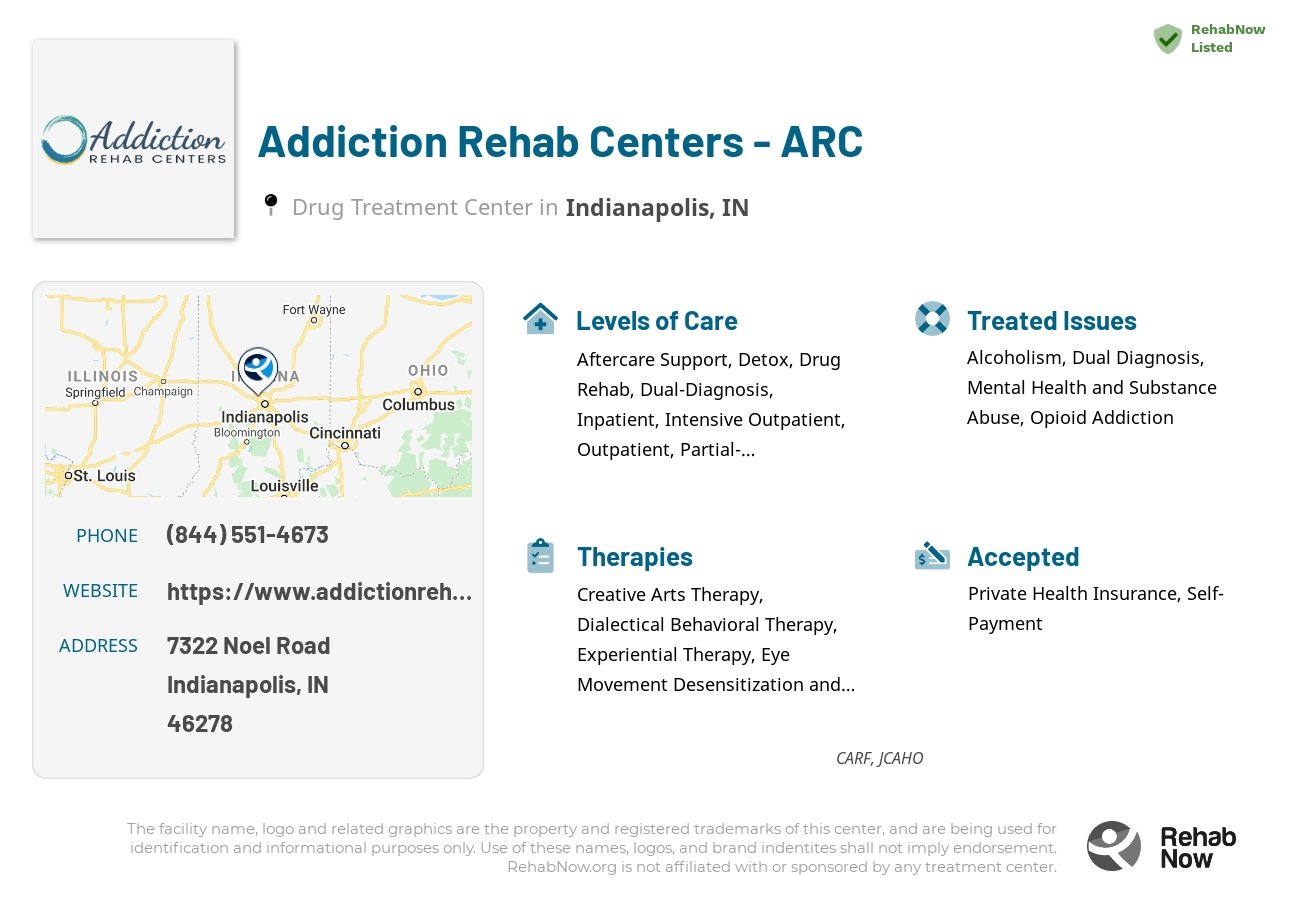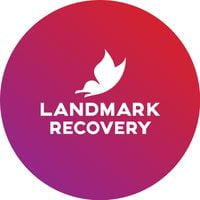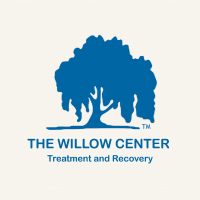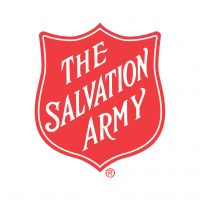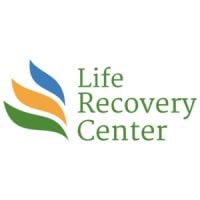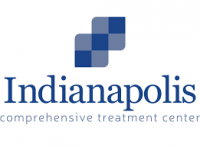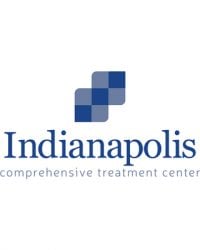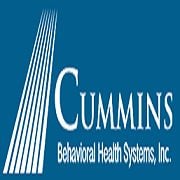Addiction Rehab Centers - ARC
Drug Rehab Center in Indianapolis, Indiana
Addiction Rehab Centers (ARC), located in Indianapolis, IN, offers a variety of specialized services focused on alcohol and opioid addiction, such as residential long-term care, inpatient and outpatient treatments, and trauma and cognitive behavioral therapy, all of which are accredited by LegitScript, CARF, and JCAHO.
About Addiction Rehab Centers - ARC in Indiana
Located in Indianapolis, Indiana, Addiction Rehab Centers (ARC) is a beacon of hope for individuals battling drug or alcohol addiction. Offering a comprehensive range of treatments including detox, inpatient, and outpatient services, ARC stands out with its unique combination of attachment theory and the 12-Step process. With a capacity for 10 beds, this facility focuses on creating a family-like atmosphere where everyone’s needs are understood and addressed.
With respected accreditations from LegitScript, CARF, and JCAHO, Addiction Rehab Centers not only assures quality care but also provides peace of mind to its clients. Their approach to treatment is personalized, integrating evidence-based therapies with education and family support to pave a path toward recovery.
- Unique combination of attachment theory and the 12-Step process tailors a more personalized recovery experience.
- A wide continuum of care including detox, inpatient, partial hospitalization, intensive outpatient, and aftercare support, offers solutions for every stage of recovery.
- Accredited by LegitScript, CARF, and JCAHO, ensuring a commitment to the highest standards of care and safety.
At ARC, individuals struggling with alcoholism, opioid addiction, dual diagnosis, or other substance abuse issues find help and hope. Treatment methods range from medication-assisted detox to individual, group, and family therapy, catering to various levels of care required by clients.
Genders
Ages
Modality
Additional
Accreditations

LegitScript

JCAHO

CARF
The Commission on Accreditation of Rehabilitation Facilities (CARF) is a non-profit organization that specifically accredits rehab organizations. Founded in 1966, CARF's, mission is to help service providers like rehab facilities maintain high standards of care.
Conditions and Issues Treated
Opioids are a group of drugs that include substances such as heroin, morphine, and oxycodone. These drugs activate opioid receptors in the brain, which produce pleasurable feelings. Opioid addiction occurs when drugs are abused at increasing rates or increasing amounts because the body becomes tolerant of them.
Opioid addiction is typically diagnosed when drug abuse becomes a typical behavior that interferes with an individual’s ability to function daily. The use of the substance results in consequences like legal problems.
Treatment for opioid addiction varies depending on each individual’s needs. Some treatments focus on replacing opioids with other drugs that have similar effects of reducing withdrawal symptoms. Other treatments aim to reduce the risk of relapse by providing psychological support or using more natural methods.
A drug rehab center that uses Dual Diagnosis is more likely to be successful in rehabilitating a person. Dual diagnosis helps to identify and treat any co-occurring disorders. It is essential to screen for both addiction and any untreated mental health issues. A dual diagnosis gives rehab the means to treat addiction while restoring mental and emotional health.
About 70% of patients with drug addiction have at least one other psychiatric diagnosis. Fortunately, dual diagnosis treatment is a proven model that has been highly effective.
Levels of Care Offered
This center offers a variety of custom treatment tailored to individual recovery. Currently available are Aftercare Support, Detox, Drug Rehab, Dual-Diagnosis, Inpatient, Intensive Outpatient, Outpatient, Partial-Hospitalization, with additional therapies available as listed below.
Detox, or detoxification, is the method of weaning a person’s body from the toxic substance(s) they have abused. This is a slow process under medical supervision and one that should occur for almost all individuals. As detox can cause medical complications, it should always be performed by experienced medical professionals in a safe setting.
Inpatient rehab means you live there while your addiction or co-occurring disorder is treated. Prescribed medications are used along with counseling.
This type of rehabilitation provides a drug-free environment for people who struggle with chronic/long-term addiction (or their own home). Jobs or school can be put on hold until after the stay to focus solely on recovery.
An intensive outpatient program is usually the first phase of addiction treatment. It provides relief for those addicted, but not ready to commit to an inpatient setting. IOPs consist of a daily 3 to 5-hour program, and there is a required number of hours per week. The goal here is to teach patients healthy coping skills, such as stress management.
Outpatient programs offer a lower intensity level of addiction treatment than inpatient facilities. They are ideal for those who have graduated from inpatient facilities, have a supportive home environment, and are motivated to commit to the program. Services offered include medication-assisted treatment, individual and group therapy, and peer group support.
This treatment is a popular option for those suffering from a lower intensity addiction. It is not advisable for someone who needs to go through a medically supervised detox or does not have a supportive home environment. It requires motivation and dedication to commit to the program without constant monitoring.
For people looking for drug treatment, partial hospitalization programs offer an alternate option to inpatient rehab or residential treatment. Patients attend therapy sessions for a set number of hours each day. They can typically visit family or go home during non-therapy hours.
Partial hospitalization programs can last from one to six months and are appropriate for patients with acute addiction symptoms. Addiction Rehab Centers - ARC offers a partial hospitalization program in , and is a good option for people looking for drug treatment.
Aftercare Support in drug rehab is crucial because it helps people stay sober after treatment. Aftercare Support in drug rehab is helpful because it provides the recovering person with a support group, including family members, friends, and other peers who are also in recovery.
The benefits of Aftercare Support are that it provides a pathway that will help people get sober for life. It supports healing at all levels, physical, mental, emotional, and spiritual. Another benefit of Aftercare Support is that participants learn to maintain their sobriety through holistic methods. They learn to modify behaviors individually to have peace of mind, have positive relationships with others, and find peace on the inside.
Therapies & Programs
During individual therapy at Addiction Rehab Centers - ARC in , the person in recovery meets with a therapist one on one to go over their situation and learn from past mistakes. The counselor or therapist will use this time to address the causes of addiction, triggers, and any mental issue or dual diagnosis. They will also address aftercare plans, giving them the best chances of long-term sobriety.
This therapeutic process is very intense and challenging to go through. Some clients may find it easier to open up with someone apart from their family or loved ones who understand their struggles and experience with addiction.
Family therapy is designed to help addicts get clean and sober by using what they love the most; their family. Most drug treatment centers make it mandatory that the addict’s family attend therapy sessions, which is great because having everyone there to support them makes it much easier for them to get clean. Not only are they surrounded by people who want them to get better, but everyone is there because they want the best for them, not because they feel like they have to be.
Drug addicts are often surrounded by resentful or uneducated family members who would, at times, rather see them stay addicted because it makes their own lives easier. Sometimes they don’t understand what the addiction is or how they play a part in it. They know that during and after the addict’s sobriety journey, they will face challenges and changes that they aren’t sure how to handle. This can be very tough for an addict to go through on their own, which is why it’s so important that they have the support of their family. Just because someone is an addict does not mean that they don’t deserve the love and support of those around them.
Addicts in Indianapolis, IN can find support in group therapy at Addiction Rehab Centers - ARC by finding peers who understand their situation and being held accountable. They also learn to develop faith, understanding, and insight into their addiction through shared conversations.
Group Therapy is employed by drug treatment centers to provide the recovering addict with a platform to talk about their feelings and experiences. It also provides for an opportunity to learn from other addicts who have successfully overcome their addiction. It is recommended that all group members be recovering addicts for this type of therapy to work.
Trauma therapy allows people who struggled with a past trauma to face the situation and learn from it. Many people go through traumatic events at an early age that later leads them into addiction as adults. By addressing this issue during treatment at Addiction Rehab Centers - ARC in [/type], you can move forward with your recovery process and take back control of your sober future, too!
Traumas are one of the most common causes of psychological disorders such as Addiction Disorder. It’s often found among those diagnosed with Addictive Disorders because traumatized individuals have strong emotions or thoughts related to their traumas, leading to addictive behaviors.
Dialectical behavior therapy (DBT) is a cognitive-behavioral therapy that focuses on eliminating specific negative thoughts, such as suicidal thoughts. These negative thoughts can potentially lead to an individual inflicting self-harm. It helps treat patients exhibiting uncontrollable emotions, intense mood swings, and borderline personality disorders.
The term “Dialectic” means the integration of opposites. In substance abuse, DBT refers to accepting the patient’s addiction and working to change their thoughts and behavior. It improves life skills such as controlling intense emotions without reacting impulsively, resolving interpersonal conflicts effectively, and promoting awareness about self and others.
Cognitive Behavioral Therapy (CBT) helps addicts comprehend the causes of their substance abuse and the consequences that follow. The treatment’s goal is to help addicts gain self-control and maintain abstinence from drugs and alcohol over the long term. Through CBT, clients learn to recognize and avoid high-risk situations and cope with challenging situations when they arise.
Eye movement desensitization and reprocessing, or EMDR, is another therapeutic technique typically used for addiction recovery. This type of therapy works by stimulating brain activity to help the addict process past emotions without relapsing on their drug of choice.
EMDR can be particularly effective for recovering addicts who have trouble recalling the events that lead up to their addiction. By helping the addict recall these memories under safe conditions, this therapy can help reduce their risk of relapse during difficult moments.
Patient Experience
Creative Arts
Creative arts therapy, or expressive therapy, is beneficial to those battling addiction. It can include writing, music, drama, art, and other forms of self-expression. It improves the patient’s emotional state and allows them to focus on something other than addiction. It allows Addiction Rehab Centers - ARC to examine how their feelings and emotions play out through the creative process in Indianapolis, IN.
Recovery can be a difficult process, but it is possible to heal and move forward with the help of creative arts therapy. If you or a loved one is struggling with addiction in , , consider using creative arts therapy to help the recovery process.
Experiential Therapy at Addiction Rehab Centers - ARC
Experiential therapy is a type of treatment involving immediate, intense experiences designed to manage addiction. Experiential therapy is beneficial for:
- People who are seeking to overcome an addiction but have difficulty focusing on treatment goals
- People with short attention spans due to high levels of stress or difficulty concentrating
- People who are afraid of engaging in treatment due to negative past experiences
Payment Options Accepted
For specific insurance or payment methods please contact us.
Is your insurance accepted?
Ask an expert, call (888) 674-0062
Additional Details
Specifics, location, and helpful extra information.
Indianapolis, Indiana 46278 Phone Number(844) 551-4673 Meta DetailsUpdated April 15, 2024
Staff Verified
Is Addiction Rehab Centers – ARC a LegitScript Verified Treatment Facility?
According to our most recent records, we have found this center to be LegitScript verified.
Addiction Rehab Centers - ARC Patient Reviews
There are no reviews yet. Be the first one to write one.
Indianapolis, Indiana Addiction Information
The state of Indiana ranks 14th in the nation for drug abuse, but 17th for drug overdoses. The state has many high-quality rehabilitation centers, but reports show that there are about 20 deaths per 100,000 people. This is due to its location making it a drug trafficking haven, where many drugs are further distributed into the country.
The drug addiction problem in Indianapolis, Indiana, is quite severe. There were over 1,600 overdose deaths in Indianapolis between 1999 and 2016. This means that, on average, there were about 100 overdose deaths per year in Indianapolis during that period. Rehab centers in Indianapolis, Indiana, offer a variety of programs, including inpatient and outpatient programs, 12-step programs, and faith-based programs.
Treatment in Nearby Cities
- Wabash, IN (67.9 mi.)
- Newburgh, IN (146.9 mi.)
- Terre Haute, IN (66.3 mi.)
- Lagrange, IN (129.9 mi.)
- Tell City, IN (136.2 mi.)
Centers near Addiction Rehab Centers - ARC
The facility name, logo and brand are the property and registered trademarks of Addiction Rehab Centers - ARC, and are being used for identification and informational purposes only. Use of these names, logos and brands shall not imply endorsement. RehabNow.org is not affiliated with or sponsored by Addiction Rehab Centers - ARC.





